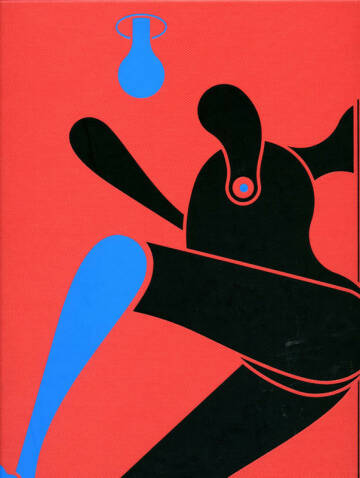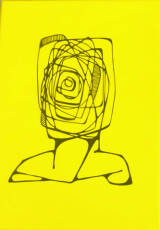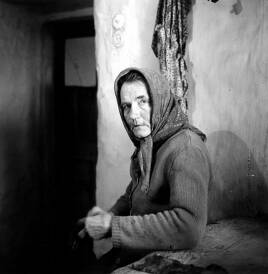ON (signed)
by Eamonn Doyle
Photographs: Eamonn Doyle
Publisher: D1
104 pages
Pictures: 51
Year: 2015
ISBN: 9780992848712
Price: 350 €
Comments: Hardcover, Limited edition of 999. Three different covers printed with colour foils and deboss. 333 of each cover, 38.5cm x 28.5cm, 51 Black & White tritone printed images printed on Lessebo design naturel 150 gm paper. Blue cover version. Condition: new.
Eamonn Doyle’s second photo-book, ‘ON, follows last year’s ‘i’, a collection of street portraits from Dublin city centre. In ‘ON’, black and white figures stalk across Dublin streetscapes, by turns lost, menacing, wary, browbeaten or entranced – but always at odds in some way with their environment.
As in ‘i’, the photographs were mostly taken on Dublin’s Parnell Street and O’Connell Street. But here the historic role of those two streets as zones of resistance, protest and insurrection is far more present. The very title of the book itself evokes a resistance – that doggedly existential kind identified by Samuel Beckett’s narrator in ‘The Unnameable’: ‘You must go on, I can’t go on, I’ll go on.’
The figures are dynamic – muscles taut, heads in mid-turn, bodies in motion. Some flee the photographic gaze itself. Others stare challengingly down the barrel of the lens. Most appear caught up in projects so intensely private that they have an air of total inaccessibility. Rarely does the photographic act intrude so little on the lives of its subjects. Paradoxically, the energy is sought at precisely those moments when the unruly subjects look most likely to tear the images asunder.
The central drama of the book could thus be said to be its subjects’ struggle with representation – not necessarily against it, but writhing, wriggling, jockeying with it. The resulting images invariably draw attention to the photographic act. One never forgets that these images have been selected, framed, constructed. One is never tempted to identify the image with the subject of the image or to respond ‘I know exactly how that person feels.’ The interiority of the subjects is preserved; their dignity remains intact.
‘ON’ opens out to history more directly than its predecessor. Whereas ‘I’ was preoccupied with figures consumed by introspection, the dramas in ‘ON’ are far more environmental. Dublin’s hermetic seal has cracked open and the rest of the world has somehow spilled in. These subjects are photographed mostly from the front and from a lower angle. It’s a presentation that opens out their world, contextualising them by placing them against an architectural backdrop. Where the mysterious, often faceless figures of ‘i’ were often flattened against their worlds, the subjects of ‘ON’ stand out and strike out against their environments, often looming against skies in a way that speaks of possibility, even as they nurse wounds or eye each other suspiciously.
- John McMahon
Available in with red or green cover!
More books by Eamonn Doyle
-
END. (signed - last copy)
by Eamonn Doyle
sold out -
K. (signed)
by Eamonn Doyle
Euro 140 -
i (signed)
by Eamonn Doyle
sold out -
ONE (signed)
by Eamonn Doyle
Euro 70
more books tagged »urban « | >> see all
-
à propos de Paris
by Henri Cartier-Bresson
sold out -
The Gardener (book + print)
by Jan Brykczynski
sold out -
My Lagos
by Robin Hammond
Euro 95 -
Teamphoto: Portraits of the People Who Built Britain's First H...
by Brian Griffin
Euro 95 -
Black & White (signed)
by Bruce Davidson
sold out -
Rivers & Towns
by Mark Steinmetz
sold out
more books tagged »portrait« | >> see all
-
野生 (last copy)
by Ren Hang
sold out -
Leviathan
by Morgan Ashcom
sold out -
I'm Good I'm Great I'm Wonderful
by Vesselina Nikolaeva
Euro 15 -
Works
by Michael Wolf
sold out -
Wahr Genommen (last copy)
by Branko Lenart
Euro 45 -
Wildfremd Magazin Nr. 1 (Magazin + Print)
by Christopher Mavric
Euro 29
more books tagged »dublin« | >> see all
more books tagged »black and white« | >> see all
-
Rura (signed)
by Krzysztof Racon
sold out -
Inner City (London)
by Peter Köllerer
Euro 28 -
New York in the 70s
by John Claridge
sold out -
Woman with a Monkey (special edition + print - last copy)
by Justyna Mielnikiewicz
sold out -
In the Meantime: Europe
by Hana Jakrlova
Euro 39 -
KARCZEBY
by Adam Panczuk
sold out
more books tagged »street photography« | >> see all
-
Street Photographer 2016
by Michele Paggetta
Euro 15 -
Epilogue (New Edition)
by Michael Ackerman
Euro 38 -
Der Grazer Gehfotograf
by Mila Palm
sold out -
Rome - Malibu
by Ari Marcopoulos
sold out -
Street Encounters (last copy)
by Evgeny Vasin
Euro 95 -
Backyard Diaries Vol.2 (signed)
by Nikita Teryoshin
sold out
more books tagged »Ireland « | >> see all
-
Beyond Maps and Atlases (signed)
by Bertien van Manen
Euro 85 -
Beyond Maps and Atlases (signed) - used copy
by Bertien van Manen
Euro 65 58.50 -
Beyond Maps and Atlases (signed)
by Bertien van Manen
sold out -
Flaming Grace (signed)
by Vivian Keulards
Euro 40 -
Dublin (last copy)
by Krass Clement
sold out -
Ghosts of the Faithful Departed
by David Creedon
sold out
Random selection from the Virtual bookshelf josefchladek.com
ON (signed)
by Eamonn Doyle
Photographs: Eamonn Doyle
Publisher: D1
104 pages
Pictures: 51
Year: 2015
ISBN: 9780992848712
Price: 350 €
Comments: Hardcover, Limited edition of 999. Three different covers printed with colour foils and deboss. 333 of each cover, 38.5cm x 28.5cm, 51 Black & White tritone printed images printed on Lessebo design naturel 150 gm paper. Blue cover version. Condition: new.
Eamonn Doyle’s second photo-book, ‘ON, follows last year’s ‘i’, a collection of street portraits from Dublin city centre. In ‘ON’, black and white figures stalk across Dublin streetscapes, by turns lost, menacing, wary, browbeaten or entranced – but always at odds in some way with their environment.
As in ‘i’, the photographs were mostly taken on Dublin’s Parnell Street and O’Connell Street. But here the historic role of those two streets as zones of resistance, protest and insurrection is far more present. The very title of the book itself evokes a resistance – that doggedly existential kind identified by Samuel Beckett’s narrator in ‘The Unnameable’: ‘You must go on, I can’t go on, I’ll go on.’
The figures are dynamic – muscles taut, heads in mid-turn, bodies in motion. Some flee the photographic gaze itself. Others stare challengingly down the barrel of the lens. Most appear caught up in projects so intensely private that they have an air of total inaccessibility. Rarely does the photographic act intrude so little on the lives of its subjects. Paradoxically, the energy is sought at precisely those moments when the unruly subjects look most likely to tear the images asunder.
The central drama of the book could thus be said to be its subjects’ struggle with representation – not necessarily against it, but writhing, wriggling, jockeying with it. The resulting images invariably draw attention to the photographic act. One never forgets that these images have been selected, framed, constructed. One is never tempted to identify the image with the subject of the image or to respond ‘I know exactly how that person feels.’ The interiority of the subjects is preserved; their dignity remains intact.
‘ON’ opens out to history more directly than its predecessor. Whereas ‘I’ was preoccupied with figures consumed by introspection, the dramas in ‘ON’ are far more environmental. Dublin’s hermetic seal has cracked open and the rest of the world has somehow spilled in. These subjects are photographed mostly from the front and from a lower angle. It’s a presentation that opens out their world, contextualising them by placing them against an architectural backdrop. Where the mysterious, often faceless figures of ‘i’ were often flattened against their worlds, the subjects of ‘ON’ stand out and strike out against their environments, often looming against skies in a way that speaks of possibility, even as they nurse wounds or eye each other suspiciously.
- John McMahon
Available in with red or green cover!
More books by Eamonn Doyle
-
END. (signed - last copy)
by Eamonn Doyle
sold out -
K. (signed)
by Eamonn Doyle
Euro 140 -
i (signed)
by Eamonn Doyle
sold out -
ONE (signed)
by Eamonn Doyle
Euro 70
more books tagged »urban « | >> see all
-
à propos de Paris
by Henri Cartier-Bresson
sold out -
The Gardener (book + print)
by Jan Brykczynski
sold out -
My Lagos
by Robin Hammond
Euro 95 -
Teamphoto: Portraits of the People Who Built Britain's First H...
by Brian Griffin
Euro 95 -
Black & White (signed)
by Bruce Davidson
sold out -
Rivers & Towns
by Mark Steinmetz
sold out
more books tagged »portrait« | >> see all
-
野生 (last copy)
by Ren Hang
sold out -
Leviathan
by Morgan Ashcom
sold out -
I'm Good I'm Great I'm Wonderful
by Vesselina Nikolaeva
Euro 15 -
Works
by Michael Wolf
sold out -
Wahr Genommen (last copy)
by Branko Lenart
Euro 45 -
Wildfremd Magazin Nr. 1 (Magazin + Print)
by Christopher Mavric
Euro 29
more books tagged »dublin« | >> see all
more books tagged »black and white« | >> see all
-
Rura (signed)
by Krzysztof Racon
sold out -
Inner City (London)
by Peter Köllerer
Euro 28 -
New York in the 70s
by John Claridge
sold out -
Woman with a Monkey (special edition + print - last copy)
by Justyna Mielnikiewicz
sold out -
In the Meantime: Europe
by Hana Jakrlova
Euro 39 -
KARCZEBY
by Adam Panczuk
sold out
more books tagged »street photography« | >> see all
-
Street Photographer 2016
by Michele Paggetta
Euro 15 -
Epilogue (New Edition)
by Michael Ackerman
Euro 38 -
Der Grazer Gehfotograf
by Mila Palm
sold out -
Rome - Malibu
by Ari Marcopoulos
sold out -
Street Encounters (last copy)
by Evgeny Vasin
Euro 95 -
Backyard Diaries Vol.2 (signed)
by Nikita Teryoshin
sold out
more books tagged »Ireland « | >> see all
-
Beyond Maps and Atlases (signed)
by Bertien van Manen
Euro 85 -
Beyond Maps and Atlases (signed) - used copy
by Bertien van Manen
Euro 65 58.50 -
Beyond Maps and Atlases (signed)
by Bertien van Manen
sold out -
Flaming Grace (signed)
by Vivian Keulards
Euro 40 -
Dublin (last copy)
by Krass Clement
sold out -
Ghosts of the Faithful Departed
by David Creedon
sold out
Random selection from the Virtual bookshelf josefchladek.com
ON (signed)
by Eamonn Doyle
Photographs: Eamonn Doyle
Publisher: D1
104 pages
Pictures: 51
Year: 2015
ISBN: 9780992848712
Price: 350 €
Comments: Hardcover, Limited edition of 999. Three different covers printed with colour foils and deboss. 333 of each cover, 38.5cm x 28.5cm, 51 Black & White tritone printed images printed on Lessebo design naturel 150 gm paper. Blue cover version. Condition: new.
Eamonn Doyle’s second photo-book, ‘ON, follows last year’s ‘i’, a collection of street portraits from Dublin city centre. In ‘ON’, black and white figures stalk across Dublin streetscapes, by turns lost, menacing, wary, browbeaten or entranced – but always at odds in some way with their environment.
As in ‘i’, the photographs were mostly taken on Dublin’s Parnell Street and O’Connell Street. But here the historic role of those two streets as zones of resistance, protest and insurrection is far more present. The very title of the book itself evokes a resistance – that doggedly existential kind identified by Samuel Beckett’s narrator in ‘The Unnameable’: ‘You must go on, I can’t go on, I’ll go on.’
The figures are dynamic – muscles taut, heads in mid-turn, bodies in motion. Some flee the photographic gaze itself. Others stare challengingly down the barrel of the lens. Most appear caught up in projects so intensely private that they have an air of total inaccessibility. Rarely does the photographic act intrude so little on the lives of its subjects. Paradoxically, the energy is sought at precisely those moments when the unruly subjects look most likely to tear the images asunder.
The central drama of the book could thus be said to be its subjects’ struggle with representation – not necessarily against it, but writhing, wriggling, jockeying with it. The resulting images invariably draw attention to the photographic act. One never forgets that these images have been selected, framed, constructed. One is never tempted to identify the image with the subject of the image or to respond ‘I know exactly how that person feels.’ The interiority of the subjects is preserved; their dignity remains intact.
‘ON’ opens out to history more directly than its predecessor. Whereas ‘I’ was preoccupied with figures consumed by introspection, the dramas in ‘ON’ are far more environmental. Dublin’s hermetic seal has cracked open and the rest of the world has somehow spilled in. These subjects are photographed mostly from the front and from a lower angle. It’s a presentation that opens out their world, contextualising them by placing them against an architectural backdrop. Where the mysterious, often faceless figures of ‘i’ were often flattened against their worlds, the subjects of ‘ON’ stand out and strike out against their environments, often looming against skies in a way that speaks of possibility, even as they nurse wounds or eye each other suspiciously.
- John McMahon
Available in with red or green cover!
More books by Eamonn Doyle
-
END. (signed - last copy)
by Eamonn Doyle
sold out -
K. (signed)
by Eamonn Doyle
Euro 140 -
i (signed)
by Eamonn Doyle
sold out -
ONE (signed)
by Eamonn Doyle
Euro 70
more books tagged »urban « | >> see all
-
à propos de Paris
by Henri Cartier-Bresson
sold out -
The Gardener (book + print)
by Jan Brykczynski
sold out -
My Lagos
by Robin Hammond
Euro 95 -
Teamphoto: Portraits of the People Who Built Britain's First H...
by Brian Griffin
Euro 95 -
Black & White (signed)
by Bruce Davidson
sold out -
Rivers & Towns
by Mark Steinmetz
sold out
more books tagged »portrait« | >> see all
-
野生 (last copy)
by Ren Hang
sold out -
Leviathan
by Morgan Ashcom
sold out -
I'm Good I'm Great I'm Wonderful
by Vesselina Nikolaeva
Euro 15 -
Works
by Michael Wolf
sold out -
Wahr Genommen (last copy)
by Branko Lenart
Euro 45 -
Wildfremd Magazin Nr. 1 (Magazin + Print)
by Christopher Mavric
Euro 29
more books tagged »dublin« | >> see all
more books tagged »black and white« | >> see all
-
Rura (signed)
by Krzysztof Racon
sold out -
Inner City (London)
by Peter Köllerer
Euro 28 -
New York in the 70s
by John Claridge
sold out -
Woman with a Monkey (special edition + print - last copy)
by Justyna Mielnikiewicz
sold out -
In the Meantime: Europe
by Hana Jakrlova
Euro 39 -
KARCZEBY
by Adam Panczuk
sold out
more books tagged »street photography« | >> see all
-
Street Photographer 2016
by Michele Paggetta
Euro 15 -
Epilogue (New Edition)
by Michael Ackerman
Euro 38 -
Der Grazer Gehfotograf
by Mila Palm
sold out -
Rome - Malibu
by Ari Marcopoulos
sold out -
Street Encounters (last copy)
by Evgeny Vasin
Euro 95 -
Backyard Diaries Vol.2 (signed)
by Nikita Teryoshin
sold out
more books tagged »Ireland « | >> see all
-
Beyond Maps and Atlases (signed)
by Bertien van Manen
Euro 85 -
Beyond Maps and Atlases (signed) - used copy
by Bertien van Manen
Euro 65 58.50 -
Beyond Maps and Atlases (signed)
by Bertien van Manen
sold out -
Flaming Grace (signed)
by Vivian Keulards
Euro 40 -
Dublin (last copy)
by Krass Clement
sold out -
Ghosts of the Faithful Departed
by David Creedon
sold out
Random selection from the Virtual bookshelf josefchladek.com



















































;jpg?c=aa3f40f604606d120cf001a56c863c89)







_;jpg?c=f45922546a211df6d73c17ae6c7434c5)




;jpg?c=0375dbdc9a8eebd432f9cd0f30998365)